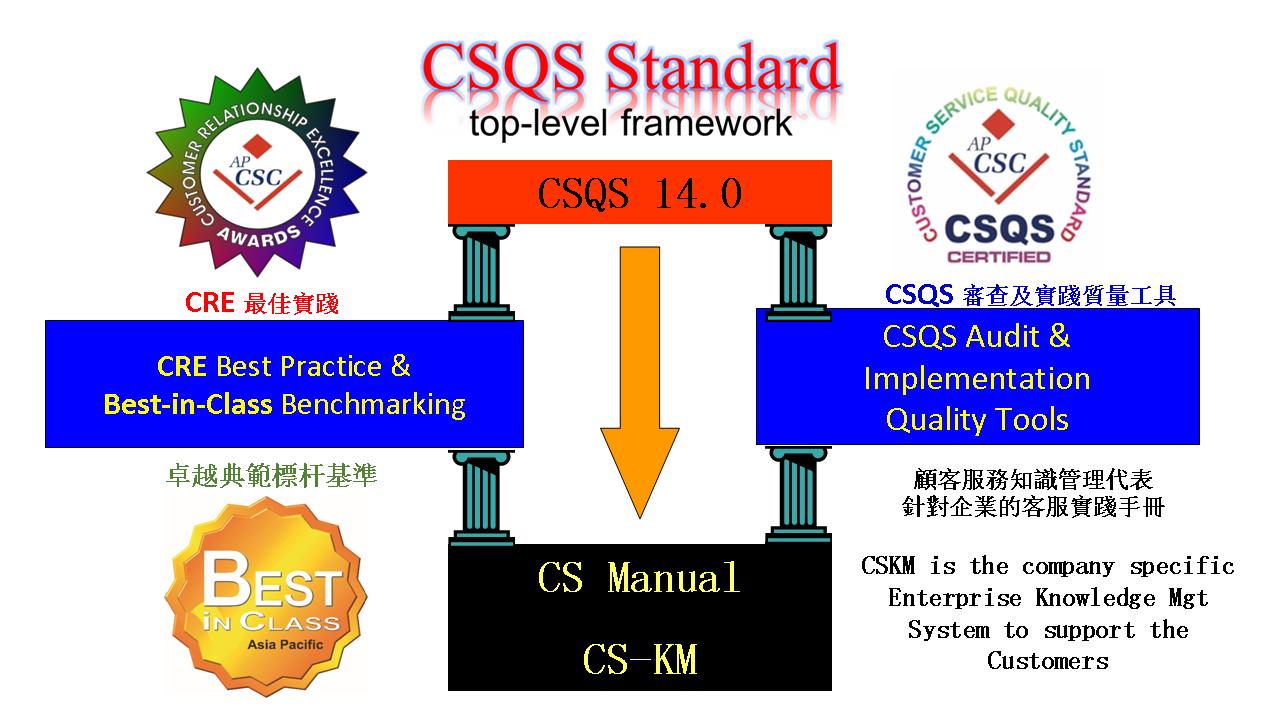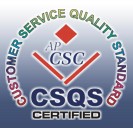Introduction & Overview of the CSQS
The Customer Service Quality Standard (CSQS) has
been developed in conjunction with the Asia Pacific Customer
Service Consortium and research members from the
University of Hong Kong,
lead by Professor George Huang to assess the overall
service quality, best practice compliance and performance of the
customer service operation as well as the entire service
organization.
It
is the most comprehensive certification dedicated to a robust
customer centric world class service framework awarded to
organizations that excel in customer relationship excellence.
The main aim of the CSQS is to establish a practitioner-based,
user-driven set of best-practice guidelines that can be followed to
improve and manage the service operation systematically and
effectively so as to provide consistently excellent services to meet
and exceed customer requirements and expectations.
Excellence Model
“Many companies are struggling to achieve service excellence
branding. Despite the goodwill of many organizations in search for
innovative and effective ways to enhance customer interactions,
existing quality standards do not fully answer the total needs of
customers,” said Jason Chu, Chairman of APCSC. “That explains why
APCSC has jointly developed the Customer Service Quality Standard (CSQS)
with the University of Hong Kong to provide a roadmap for
organizations to bridge the expectation gap.”
Integration of
balanced scorecard & ISO9000
CSQS holds the most advanced and comprehensive key to providing a
clear step-by-step roadmap for companies to deliver the best customer
services. It embraces and integrates the balanced scorecard (BSC)
management system and the ISO9000 quality management to provide a
world-class framework with crystal clear directions for transforming
an organization into a customer-centric unit.
A further goal of the CSQS guidelines is to enhance a common
understanding of the customer centric service best practices for
organizations and departments in serving both internal and external
customers to improve their business performance, to align the
approach throughout the company, and to improve interdepartmental
and company wide integration.
The yardsticks
for the CRE Awards
CSQS is so crucial to customer service that it became the yardsticks
for the CRE Awards. “CSQS is important to CRE Awards judging criteria
as a fundamental reference that characterizes world class
organizations. Furthermore, the CSQS has incorporated the
advancements that are strategic and business practical from the CRE
Awards winners’ business case presentations annually to create a
progressive service movement,” said Chu.
CSKM empowers the
frontline
The assessment of CSQS is progressively divided into three levels:
intention, implementation and integration. CSQS not only measure if
a company has achieved certain levels, but also benchmarking with
the industry, and more importantly, how well they have adopted the
Customer Service Knowledge Management (CSKM) to empower the
frontline staff to deliver the best customer experience.
3 levels of CSQS
Achievement
According to Chu, it is a three-dimensional accreditation scoring
system that takes into account every aspect from both independent
and interrelated perspectives: Level I
Operation Service Center;
Level II Proactive Service Center; Level III Strategic Business
Unit.
This year, China
Pacific Life Insurance Co., Ltd. and Henderson Land Group
Property Management Department have attained the highest
accreditation of CSQS, Level III Strategic Business Unit. In the
future, CSQS will continue to evolve to be an even more robust
roadmap for companies to learn, incorporate and implement a quality
managing system that fulfills and exceeds customer expectations.
Why is CSQS Necessary?
The CSQS sets
forth a set of generic CRE guidelines that assists the
organization in instituting good practices and compliance and to
empower the customer service and operation to greatly uplift
their capability to improve the overall success, Voice of
Customer quality system and performance.
A further goal of
the guidelines is to enhance a common understanding of the customer
service best practice, to encourage organizational focus on customer
needs to improve their business performance, to align the approach
throughout the company and industry and to improve inter-company
co-operation. This can be further summarised as follows:-
-
To drive
Customer Relationship Excellence as
core business value
throughout the organization
with endorsement from the top management to frontline operations
-
To improve
organizational performance, best practices, capabilities, and
results with Quality Management tools for continuing
development of people, process and system
-
To audit
and evaluate your service organization and systems with a World
Class Framework for Strategic planning,
Implementation,
and Organization Integration
-
To serve as a
working tool for understanding and managing performance and for
guiding planning and opportunities for learning
-
To establish a
common understanding of the customer service best practices
-
To drive
Enterprise Knowledge Management of Customer Services
meeting the CSQS framework and market competition
-
To
serve as a recognition of a company’s
outstanding performance and achieving customer relationship
excellence through the use of best practices

 |


![]()
![]()
![]()
![]()